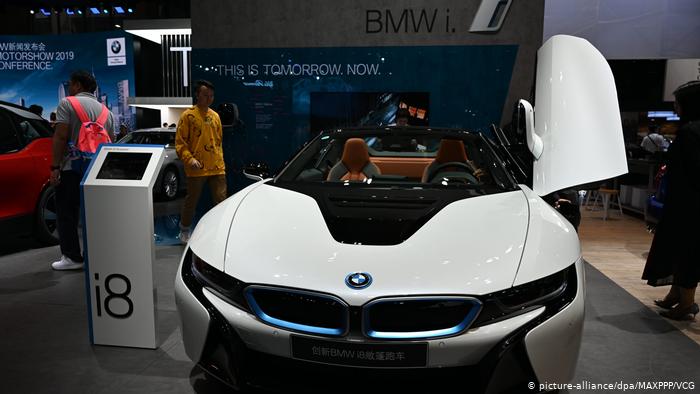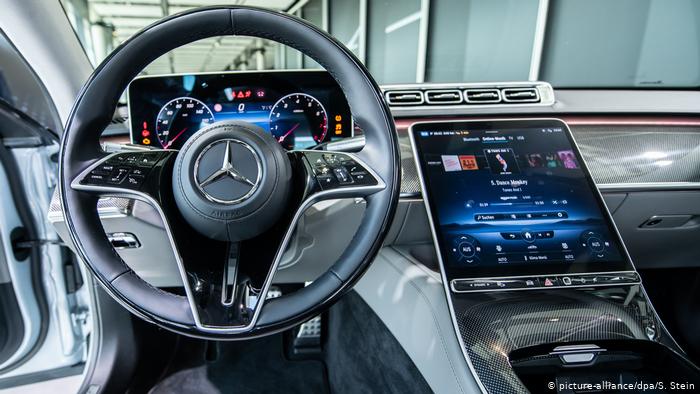One in three German cars are sold in China. The world's largest car market is increasingly developing into a lifeline for manufacturers during the coronavirus pandemic. But this also creates risks.
"German carmakers are very dependent on China," Stefan Bratzel, head of the Center of Automotive Management (CAM) tells DW.
For example, last year VW sold 40 percent of its vehicles in China. The reliance has increased because the US and European markets have been hit much harder by the pandemicthan in China. "China's car market is currently recovering and will only show a fall of five percent or less by the end of the year. Other markets will have to cope with much greater losses," according to Bratzel.
He thinks the dependency has two sides. On the one hand, the fact that China is "not only partially saving the German, but even the global automotive industry at the moment, because the market is picking up again" is positive.
In the longer term though, China should be viewed more critically. "A manufacturer's greater dependence on the Chinese market also makes it a little bit open to blackmail," he says.
Striking a balance is not easy because China has the highest growth rates and will remain the largest single market in the future. "That's why you can't just withdraw." In Bratzel's opinion, manufacturers should strive for a balanced position in global markets.

Breathing space for German carmakers
Figures for Q3 2020 will have brought relief in the corporate headquarters of Audi, BMW and Daimler. The profit curve was clearly pointing upwards again. Three months earlier, all three German premium manufacturers had to accept losses of more than 20 percent due to the pandemic.
From July to September, BMW, together with its subsidiary Mini, achieved a sales increase of 8.6% compared to the same period last year. The main driver was the almost one-third stronger business in China. The VW subsidiary Audi and the Daimler Group, with its luxury brand Mercedes-Benz, reported similar trends.
China's key role
Ferdinand Dudenhöffer from the Center for Automotive Research (CAR) sees a key role for China in the recovery of the automotive industry. "China will again be the locomotive of the automotive industry, as it was after the financial crisis," he says. In contrast, he does not yet attach great importance to recovery in Europe.
Daimler CEO Ola Källenius expects high demand from his customers in China for a long time to come. In the last ten years, the market there has grown dramatically, Källenius said recently at a video conference with business journalists. "We expect the greatest growth in China in the next ten years," he said.

In addition to the still low vehicle density in the country of 1.4 billion inhabitants, Daimler benefits from the growing wealth of the middle class. The rapid recovery in demand for premium cars in China can also be explained by the fact that buyers could not spend their money on expensive holidays abroad and instead bought a new car.
As for the idea that German carmakers are too dependent on China, Kallenius sounded a warning note. "It would be a wrong decision to say that we are too dependent on China. We would be missing out on so many opportunities."
Willingness to take risks necessary
In view of the high sales share of 40 percent of all its global sales, which the VW Group is again recording this year in China, Dudenhöffer says that being heavily dependent on a large region is always a risk. "But the question is which risk is greater: becoming dependent on China or becoming a niche supplier in China?"
China is very interested in working with Germany. According to Dudenhöffer, risks could be made "manageable" and "bearable". The US under Donald Trump is a much greater risk because it is unpredictable: "If Trump has a bad day and needs a few votes, he will raise tariffs on the German auto industry overnight."
Liberalization under pressure from Trump
But Trump has also contributed to the liberalization of the Chinese market, emphasizes Bratzel. There, the joint venture regulation which said foreign investors are only allowed to do business in China if they join forces with local companies, has been relaxed. "That was a compulsion, but this regulation, to say something positive about Trump, was adjusted under pressure from him," said Bratzel.
Tesla, for example, is one of the first companies to no longer be subject to this rule. The Tesla factory in Shanghai, which opened in January, was built without any local firms being involved.
China wants to remain the export world champion
"In addition, the Chinese government wants that domestic manufacturers and suppliers not only get stronger in China, but also play an important role in international competition," reckons Bratzel.
To do this, China must submit to international trade rules. Bratzel believes that under pressure from the US, the ruling Communist Party have already given something in this regard. "China also wants to export its products to Europe and America, and this is not just about the auto industry."
Latest Stories
-
WAFU B U-17 Girls’ Cup: Black Maidens beat Nigeria on penalties to win inaugral tournament
22 minutes -
Real Madrid beat Sevilla to keep pressure on leaders Atletico
1 hour -
Liverpool put six past Spurs to go four points clear
1 hour -
Manchester United lose 3-0 at home to Bournemouth yet again
2 hours -
CHAN 2024Q: ‘It’s still an open game’ – Didi on Ghana’s draw with Nigeria
2 hours -
CHAN 2024Q: Ghana’s Black Galaxies held by Nigeria in first-leg tie
3 hours -
Dr Nduom hopeful defunct GN bank will be restored under Mahama administration
3 hours -
Bridget Bonnie celebrates NDC Victory, champions hope for women and youth
3 hours -
Shamima Muslim urges youth to lead Ghana’s renewal at 18Plus4NDC anniversary
4 hours -
Akufo-Addo condemns post-election violence, blames NDC
4 hours -
DAMC, Free Food Company, to distribute 10,000 packs of food to street kids
6 hours -
Kwame Boafo Akuffo: Court ruling on re-collation flawed
6 hours -
Samuel Yaw Adusei: The strategist behind NDC’s electoral security in Ashanti region
6 hours -
I’m confident posterity will judge my performance well – Akufo-Addo
6 hours -
Syria’s minorities seek security as country charts new future
7 hours

